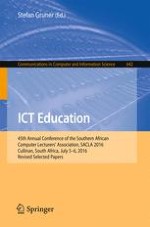2016 | Book
ICT Education
45th Annual Conference of the Southern African Computer Lecturers' Association, SACLA 2016, Cullinan, South Africa, July 5-6, 2016, Revised Selected Papers
Editor: Stefan Gruner
Publisher: Springer International Publishing
Book Series : Communications in Computer and Information Science
